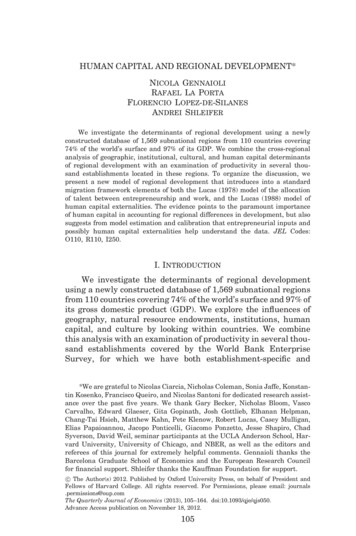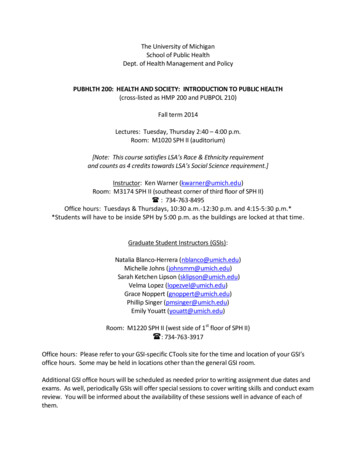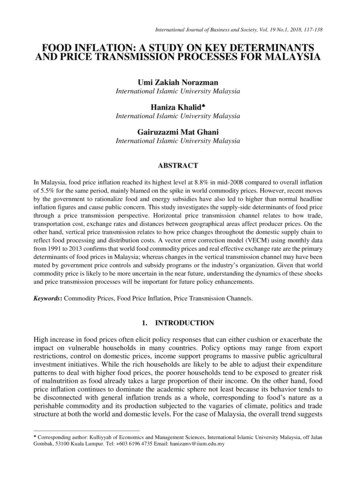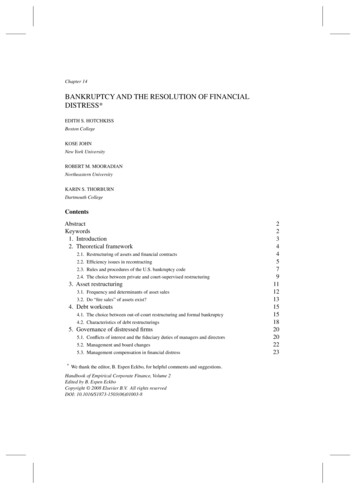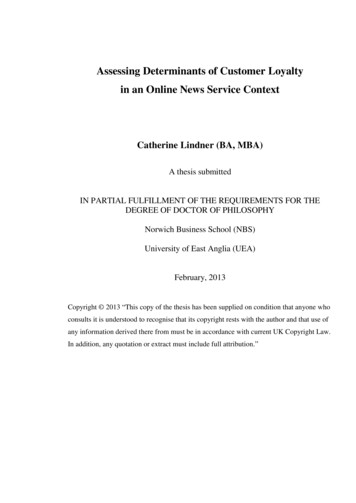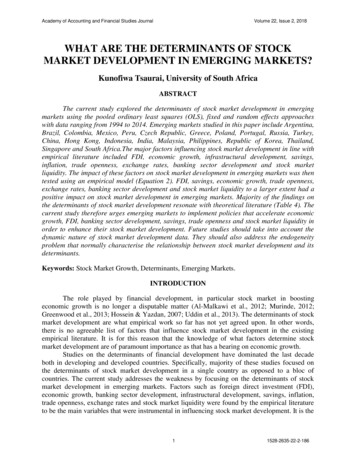
Transcription
Academy of Accounting and Financial Studies JournalVolume 22, Issue 2, 2018WHAT ARE THE DETERMINANTS OF STOCKMARKET DEVELOPMENT IN EMERGING MARKETS?Kunofiwa Tsaurai, University of South AfricaABSTRACTThe current study explored the determinants of stock market development in emergingmarkets using the pooled ordinary least squares (OLS), fixed and random effects approacheswith data ranging from 1994 to 2014. Emerging markets studied in this paper include Argentina,Brazil, Colombia, Mexico, Peru, Czech Republic, Greece, Poland, Portugal, Russia, Turkey,China, Hong Kong, Indonesia, India, Malaysia, Philippines, Republic of Korea, Thailand,Singapore and South Africa.The major factors influencing stock market development in line withempirical literature included FDI, economic growth, infrastructural development, savings,inflation, trade openness, exchange rates, banking sector development and stock marketliquidity. The impact of these factors on stock market development in emerging markets was thentested using an empirical model (Equation 2). FDI, savings, economic growth, trade openness,exchange rates, banking sector development and stock market liquidity to a larger extent had apositive impact on stock market development in emerging markets. Majority of the findings onthe determinants of stock market development resonate with theoretical literature (Table 4). Thecurrent study therefore urges emerging markets to implement policies that accelerate economicgrowth, FDI, banking sector development, savings, trade openness and stock market liquidity inorder to enhance their stock market development. Future studies should take into account thedynamic nature of stock market development data. They should also address the endogeneityproblem that normally characterise the relationship between stock market development and itsdeterminants.Keywords: Stock Market Growth, Determinants, Emerging Markets.INTRODUCTIONThe role played by financial development, in particular stock market in boostingeconomic growth is no longer a disputable matter (Al-Malkawi et al., 2012; Murinde, 2012;Greenwood et al., 2013; Hossein & Yazdan, 2007; Uddin et al., 2013). The determinants of stockmarket development are what empirical work so far has not yet agreed upon. In other words,there is no agreeable list of factors that influence stock market development in the existingempirical literature. It is for this reason that the knowledge of what factors determine stockmarket development are of paramount importance as that has a bearing on economic growth.Studies on the determinants of financial development have dominated the last decadeboth in developing and developed countries. Specifically, majority of these studies focused onthe determinants of stock market development in a single country as opposed to a bloc ofcountries. The current study addresses the weakness by focusing on the determinants of stockmarket development in emerging markets. Factors such as foreign direct investment (FDI),economic growth, banking sector development, infrastructural development, savings, inflation,trade openness, exchange rates and stock market liquidity were found by the empirical literatureto be the main variables that were instrumental in influencing stock market development. It is the11528-2635-22-2-186
Academy of Accounting and Financial Studies JournalVolume 22, Issue 2, 2018basis upon which these variables were included in the model and tested using panel data analysismethods. The study is expected to help emerging markets to development stock marketdevelopment policies that enhances economic growth. It is also expected to guide emergingmarkets on what policies needs to be crafted and implemented in order to deepen stock marketsfor economic growth purposes.The structure of the study is as follows: Part 2 is the literature on the determinants ofstock market development. Part 3 discusses the stock market development trends in emergingmarkets. Part 4 explains research methodology, results discussion and interpretation and part 5concludes the study. Part 6 is bibliography.Macroeconomic Determinants of Stock Market Development Empirical LiteratureA number of empirical studies on determinants of stock market development have beencarried out so far but those which focused on emerging markets are quite scant. Using correlationanalysis with secondary data (1992-2012), Yusoff & Guima (2015) investigated the determinantsof stock market development in Middle East and North Africa (MENA) region. Variables suchas oil rent, income per capita, domestic savings, interest rates, exchange rates and inflation werefound to have had an influential impact on stock market development in the MENA region. Astudy done by Kaehler et al. (2014) revealed that the development of the Iraq Stock Exchangeduring the period from 2004 to 2014 was influenced by the consumer price index (inflation),electricity consumption as a ratio of GDP, overall security situation, interest rates and exchangerates. Cherif & Gazdar (2010) investigated the determinants of stock market development in the14 MENA region countries using panel data and instrumental variable techniques with dataranging from 1990 to 2007. They found out that interest rates, income level, stock marketliquidity and banking sector development were the major factors that influenced stock marketdevelopment in the MENA region.In a study of the determinants of stock market in Pakistan using regression analysis withmonthly time series data (2007-2012), Dev & Shakeel (2013) found out that portfolio investmentand market liquidity were the two major factors that influenced stock markets growth inPakistan. Market capitalisation and the discount rates were found to have had an insignificantpositive impact on stock market growth in Pakistan. John et al. (2010) explored the determinantsof stock market development in Nigeria using error correction model (ECM) with annual timeseries secondary data (1970-2007). The lag of stock market development, rate of savings andstock market liquidity were found to be the instrumental factors behind stock marketdevelopment in Nigeria.Pushpakumara & Anthony (2009) also investigated the determinants of stock marketdevelopment in Sri Lanka using quantitative techniques such as correlation, regression andanalysis of variance (ANOVA) with monthly time series data from 1999 to 2008. Their findingswere threefold: (1) Inflation and exchange rates had a marginal positive impact on stock marketcapitalisation, (2) Interest rates negatively affected stock market and (3) Factors which had asignificant positive influence on stock market growth in Sri Lanka include gross domesticproduct (GDP), savings, investment and money supply. Using structural autoregressive (SVAR)approach with quarterly time series data from 2000 to 2014, Akosah (2016) studied thedeterminants of stock market development in Ghana. Election cycles, financial depth, foreigndirect investment (FDI), economic growth and current inflation rates were found to be the majorpositive determinants of stock market development in Ghana in the short and long run. Among21528-2635-22-2-186
Academy of Accounting and Financial Studies JournalVolume 22, Issue 2, 2018the variables which had a deleterious impact on stock market development in Ghana includedcountry risk premium, treasury bill rates and government expenditure (Akosah, 2016, p. 50).Using vector error correction model (VECM), Rahman et al. (2009) studied thedeterminants of Malaysian stock market development. They observed that interest rates,exchange rates, foreign currency reserves, industrial production index and money supplydetermined the direction and rate of stock market development in Malaysia. The Malaysia stockmarket growth was more influenced by industrial production index and foreign currency reservesthan it was responsive to exchange rates, interest rates and money supply (Rahman et al., 2009,p. 96). Investigating Dhaka (in Bangladesh) stock exchange growth determinants using multipleregression analysis with annual time series data from 1995 to 2015, Islam et al. (2017) noted thatconsumer price index (inflation), economic growth and total market capitalisation were the majorvariables which influenced stock market development in Bangladesh.Other empirical studies which explored the determinants of stock market developmentare summarised in Table 1.AuthorHo & Iyke(2017)Naceur etal. (2007)Hosain &Nowreen(2015)El-Nader&Alraimony(2014)Owireduet al.(2016)Jun et al.(2015)El-Wassal(2013)Shahbaz etal. (2016)Table 1A SUMMARY OF THE EMPIRICAL STUDIES ON STOCK MARKET titutional factors such as trade openness, financial liberalization, corporateA literaturegovernance and legal protection of investors had a positive effect on stock marketNo specificreviewdevelopment. Macroeconomic variables such as high inflation and weak exchangecountryapproachrates reduce stock market development whilst real GDP and high economic growthrate were found to have had a positive influence on stock market development.Stock market liquidity, savings and financial intermediary were the three variablesMENAPanel datawhich were found to have had a significant positive impact on stock marketregionanalysisdevelopment in the MENA region.Stock market development was found to have been positively influenced by stockMultiplemarket liquidity, liquidity and size in Bangladesh. Institutional and regulatoryBangladeshregressionfactors also determined stock market development in Bangladesh (Hosain &analysisNowreen, 2015, p. 91).Stock market development in Jordan was found to have been positively affected byVECM andcredit to the private sector, gross capital formation, money supply, total valuevariancetraded and consumer price index. Net remittances and nominal GDP had a negativeJordandecompositiimpact on stock market development in Jordan. On the other hand, varianceondecomposition approach noted that stock market development and macroeconomicvariables studied were co-integrated.Only stock market liquidity was found to have had a significant positive impact onMultiplestock market development. Other macroeconomic variables such as domesticGhanaregressionsavings, private capital flows and inflation had non-significant positive influenceanalysison stock market development in Ghana.High stock market liquidity, private capital flows and foreign direct investmentMultiple(FDI) were found to have had a positive and significant impact on stock marketCameroonregressiondevelopment in Cameroon. On the contrary, high banking sector development andanalysiseconomic growth negatively but non-significantly influenced stock marketdevelopment in Cameroon.Regulatory framework, political stability, banking sector development, monetaryA literatureNo specificpolicy, fiscal policy, economic size, economic growth, stage of economicreviewcountrydevelopment, portfolio capital flows and trade openness were the variables thatapproachwere found to have an influence on stock market development.Whilst inflation, economic growth investment and financial development had aVECMPakistanpositive impact on stock market development, trade openness was found to haveapproachhad a negative influence on stock market development in Pakistan.31528-2635-22-2-186
Academy of Accounting and Financial Studies JournalVolume 22, Issue 2, 2018Table 1A SUMMARY OF THE EMPIRICAL STUDIES ON STOCK MARKET DEVELOPMENTThe findings are threefold: (1) Banking sector development had a negligible impactMultipleZafaron stock market development, (2) real interest rates negatively influenced stockPakistanregression(2013)market development and (3) FDI and stock market value traded positively andmodelsignificantly affected stock market development in Pakistan.Factors such as macroeconomic stability, stock market liquidity, savings, financialNguyen &SoutheastPaneldevelopment and income growth rate positively influenced stock marketHanhAsianregressiondevelopment. On the other hand, stock market development was negatively(2012)countriesanalysisaffected by change in inflation rates and financial crisis in Southeast Asiancountries.FDI and inflation had an insignificant influence on stock market developmentAcquahMultiplewhereas treasury bill rates negatively affected stock market development in Ghana.SamGhanaregressionVariables which positively and significantly affected stock market development in(2016)modelGhana include economic growth and gross capital formation.High inflation and savings rate negatively impacted on stock market developmentAyunku &Multiplein Nigeria. The same study revealed that market capitalization, exchange rates andEtaleNigeriaregressioncredit to the private sector had a positive and significant influence on stock market(2013)modeldevelopment in Nigeria.Source: Author compilationSTOCK MARKET STRUCTURE IN EMERGING MARKETSTable 2 shows averages of the stock market development indicators for the emergingmarkets during the period from 1994 to 2014.Table 2STOCK MARKET STRUCTURE IN EMERGING MARKETS (1994-2014)Stock marketStock market total value traded Stock market turnover ratiocapitalisation(% of GDP)(%)(% of GDP)EuropeCzech RepublicGreecePolandPortugalRussiaTurkeyLatin ong KongIndonesiaIndiaMalaysiaPhilippinesRepublic .3641528-2635-22-2-186
Academy of Accounting and Financial Studies JournalVolume 22, Issue 2, 2018Table 2STOCK MARKET STRUCTURE IN EMERGING MARKETS (1994-2014)194.42101.5954.39SingaporeAfricaSouth Africa197.1647.67Source: Author’s calculations based on the World Development Database23.93Hong Kong, Malaysia, Singapore and South Africa recorded the highest mean on stockmarket capitalisation ratio above the overall mean of 87.04% of GDP. The same group of nationsare outliers considering the size of their mean stock market capitalisation ratio which are wellabove the overall mean. Argentina and Czech Republic are the two countries with the lowestmean stock market capitalisation ratios which were below the overall mean of 87.04% of GDP.China, Hong Kong, Republic of Korea and Singapore had their mean stock market valuetraded ratios above the overall mean of 46.55% of GDP. Argentina, Colombia, Mexico, Peru andPoland had the lowest mean stock market value traded ratios below the overall mean. In terms ofthe mean stock market value traded ratios Singapore and Republic of Korea are the outliers.Colombia and Peru recorded the lowest mean below the overall mean whereas Turkey,Thailand, India, China and Republic of Korea had the highest mean stock market turnover ratioabove the overall mean of 60.86% of stock market capitalisation. Republic of Korea, Turkey,India and China are the outliers using stock market turnover as a criteria.RESEARCH METHODOLOGYData and Unit of AnalysisAnnual panel secondary data of emerging markets ranging from 1994 to 2014 was usedfor the purposes of the current study. The choice of emerging markets included in the currentstudy is according to International Monetary Fund (2015) report and data availability. Forinformation on variables used and sources of data refer Table 3.General Model SpecificationTaking into account the literature (section 2) and availability of data, the determinants ofstock market development are summarised in equation 1.STOCK f (FDI, GROWTH, INFR, SAV, INFL, OPEN, EXCH, BANK, LIQUID)VariableDescriptionTable 3VARIABLES SUMMARYProxy usedSTOCKStock marketdevelopmentStock marketcapitalisation (% ofGDP)FDIForeign directinvestmentNet FDI (% ofGDP)GROWTHEconomic growthGDP per capita5[1]Source of dataWorld Development Indicators (WDI),International Financial Statistics (IFS) andGlobal Financial Indicators (GDI)World Development Indicators (WDI),International Financial Statistics (IFS) andGlobal Financial Indicators (GDI)World Development Indicators (WDI),International Financial Statistics (IFS) andGlobal Financial Indicators (GDI)1528-2635-22-2-186
Academy of Accounting and Financial Studies JournalBANKBanking Gross savingsINFLInflationOPENTrade opennessEXCHExchange rateLIQUIDStock marketliquidityVolume 22, Issue 2, 2018Table 3VARIABLES SUMMARYDomestic credit toWorld Development Indicators (WDI),private sector byInternational Financial Statistics (IFS) andbanks (% of GDP)Global Financial Indicators (GDI)ElectricWorld Development Indicators (WDI),consumption (% ofInternational Financial Statistics (IFS) andGDP)Global Financial Indicators (GDI)World Development Indicators (WDI),Gross domesticInternational Financial Statistics (IFS) andsavings (% of GDP)Global Financial Indicators (GDI)World Development Indicators (WDI),Inflation consumerInternational Financial Statistics (IFS) andprices (annual %)Global Financial Indicators (GDI)World Development Indicators (WDI),Total exports andInternational Financial Statistics (IFS) andimports (% of GDP)Global Financial Indicators (GDI)Local currencyWorld Development Indicators (WDI),against the UnitedInternational Financial Statistics (IFS) andStates Dollar (US )Global Financial Indicators (GDI)World Development Indicators (WDI),Stock market tradedInternational Financial Statistics (IFS) andvalue (% of GDP)Global Financial Indicators (GDI)Source: Author compilationVariables Used, Theory Intuition and a Priori ExpectationTable 4THEORY INTUITION AND EXPECTED SIGN(S)VariableFDIGROWTHBANKINFRSAVTheory intuitionFDI inflows enhance stock market competition and therebymaking them more efficient. There are high chances thatmultinational firms that bring FDI inflow end up listing theirshares on the stock exchange of the host country. FDI canincrease the liquidity of the stock markets if a portion of foreigninvestments is used to acquire shares in the host country.Economic growth leads to an increase of GDP per capita and thedemand of financial services. This leads to the introduction ofnew financial sector companies in order to satisfy the highappetite for financial services.Banks increase the quantity of money available for investment instock market through pooling savings and reducing liquidity risk.Increase in infrastructure investment enhances the overallperformance of firms through lowering down the cost ofproduction, opening up new production avenues and markets.The amount of capital that flows into the stock market to a largerextent relies on the quantity of savings in the economy.6SourceExpectedsignShahbaz &Rahman (2010);Levine (1997) Yartey & Adjasi(2007); Robinson(1952); & Patrick(1966) Ndikumana (2005) Ifeakachukwu(2015) Garcia & Liu(1999) 1528-2635-22-2-186
Academy of Accounting and Financial Studies JournalVolume 22, Issue 2, 2018Table 4THEORY INTUITION AND EXPECTED SIGN(S)High inflation result in repression and underdevelopment of thefinancial sector by making holding on to money assets less vitalHaslag & Kooas it they can easily lose value.(1999); IkhideInvestors are more inclined to replace transaction services forINFL(1992);money balances in a high inflation environment in order toEnglish (1999)protect the value of their assets. Their decisions lead to higherfinancial development as the rate at which financial services areproduced goes up in order to match the increased demand.Openness of the economy spurs stock market developmentHuang & TempleOPENthrough attracting foreign and domestic investment into the(2005)financial system.Olugbenga (2012);A change in exchange rates influence the company’s foreignAsaolu &EXCHprofits and overall operations which in turn affect stock prices ofOgunmuyiwathat company.(2011)Liquid stock markets allow investors to access their savings withease and enhance capital allocation. This increases the investors’Yartey & AdjasiLIQUIDconfidence in the stock market hence promoting stock market(2007)development in the long run.Trade openness of the economy attracts foreign direct investmentHuang & TempleOPEN.FDIinto the financial system hence enhancing financial sector(2005)development.Source: Author compilation- /- Econometric Model SpecificationConsistent with Sghaier and Abida (2013), equation 1 was transformed to equation 2 inorder to show the econometric relationship between stock market development and itsdeterminants. Equation 2 was estimated using the panel data analysis methods (pooled OLS,fixed and random effects). 1 FDI i ,t 2 GROWTH i ,t 3 INFRi ,t 4 SAVi ,t 5 INFLi ,t 6[2]OPENi ,t 7 EXCH i ,t 8 BANK i ,t 9 LIQUIDi ,t ƐitSTOCK i ,t 0 Where: 0 represents the intercept term whilst 1 , 2 , 3 , 4 , 5 , 6 , 7 , 8 and 9stands for co-efficients of FDI, economic growth, infrastructural development, savings, inflation,trade openness, exchange rates, banking sector development and stock market liquidityrespectively. t and i subscripts respectively represents country and time. Ɛit is the error term.RESULTS, DISCUSSION AND INTERPRETATIONThis section focus on panel unit root tests, panel co-integration tests and panel dataanalysis (Tables 5, 6 and 7 respectively).Table 5PANEL ROOT TESTS–INDIVIDUAL INTERCEPT AND **1528-2635-22-2-186
Academy of Accounting and Financial Studies JournalVolume 22, Issue 2, 2018Table 5PANEL ROOT TESTS–INDIVIDUAL INTERCEPT AND **60.36**77.72***First ***140.33***280.44***Source: Author’s compilation from E-ViewsNote: LLC, IPS, ADF and PP stands for Levin, Lin and Chu (2002); Im, Pesaran & Shin (2003); ADF Fisher ChiSquare and PP Fisher Chi Square tests respectively. *, ** and *** denote 10%, 5% and 1% levels of significance,respectively.All variables were stationary at first difference (Table 5), a condition which has to be metbefore data analysis is done. The finding paved way for panel co-integration and panel main dataanalysis.The results of a co-integration test among the ten variables under study are shown inTable 6.Table 6KAO RESIDUAL CO-INTEGRATION TESTT-statisticAugmented Dickey-Fuller (ADF)-3.7938Source: Author’s compilation from E-ViewsProbability0.0001The probability (0.0001) which is less than 5% means that the null hypothesis which saysthat there is no co-integration among the ten variables (stock market development, stock marketliquidity, banking sector development, exchange rates, trade openness, inflation, savings,infrastructural development, economic growth and FDI) is rejected. In other words, there is along run relationship among the ten variables under study in emerging markets. Table 7 showsthe panel data analysis results.Table 7PANEL REGRESSION RESULTS FOR STOCK MARKET DEVELOPMENT FUNCTIONFixed effectsRandom effectsPooled ***-2.960181528-2635-22-2-186
Academy of Accounting and Financial Studies JournalVolume 22, Issue 2, 2018Table 7PANEL REGRESSION RESULTS FOR STOCK MARKET DEVELOPMENT 8986R-squared0.5788R-squared0.6679Adjusted tic96.30Prob (F-Statistic)0.0000Prob (F-statistic)0.0000Prob (F-statistic)0.0000Source: Author compilation from E-Views (8)***/**/* indicates 1%, 5% and 10% significance levels respectively.Under all the three panel data analysis approaches, savings, exchange rate and stockmarket liquidity had a positive and significant impact on stock market development in line withliterature (Table 4). FDI positively but non-significantly influenced stock market developmentunder fixed and random effects whereas pooled OLS indicates that FDI had a positive andsignificant impact on stock market development in emerging markets, in line with Shahbaz andRahman (2010).Economic growth negatively impacted on stock market development under fixedeffects, positively and significantly influenced stock market development under random effectsand positively but non-significantly impacted on stock market development under pooled OLS.Contrary to theoretical predictions, infrastructural development negatively influenced stockmarket development across all the three panel data analysis approaches.As expected and in line with theoretical predictions (Haslag & Koo, 1999), inflation hada negative impact on stock market development in emerging markets. Trade openness positivelybut insignificantly affected stock market development under fixed effects whilst stock marketdevelopment was positively and significantly influenced by trade openness under both randomeffects and pooled OLS in emerging markets. The results resonate with Huang and Temple(2005) who argued that openness of the economy spur stock market development throughattracting foreign and domestic investment into the financial system. Both fixed and randomeffects found out that banking sector development had a positive but non-significant impact onstock market development. On the other hand, stock market development was positively andsignificantly affected by banking sector development in emerging markets. The findings are inline with Ndikumana (2005) who observed that banks increase the quantity of money availablefor investment in stock market through pooling savings and reducing liquidity risk.CONCLUSIONThe current study explored the determinants of stock market development in emergingmarkets using the pooled OLS, fixed and random effects approaches with data ranging from1994 to 2014. The major factors influencing stock market development in line with empiricalliterature included FDI, economic growth, infrastructural development, savings, inflation, tradeopenness, exchange rates, banking sector development and stock market liquidity. The impact ofthese factors on stock market development in emerging markets was then tested using anempirical model (equation 2). FDI, savings, economic growth, trade openness, exchange rates,91528-2635-22-2-186
Academy of Accounting and Financial Studies JournalVolume 22, Issue 2, 2018banking sector development and stock market liquidity to a larger extent had a positive impacton stock market development in emerging markets (Table 7). Majority of the findings on thedeterminants of stock market development resonate with theoretical literature (Table 4). Thecurrent study therefore urges emerging markets to implement policies that accelerate economicgrowth, FDI, banking sector development, savings, trade openness and stock market liquidity inorder to enhance their stock market development. Future studies should take into account thedynamic nature of stock market development data. They should also address the endogeneityproblem that normally characterise the relationship between stock market development and itsdeterminants.REFERENCESAcquah-Sam, E. (2016). Determinants of capital market development in Ghana. European Scientific Journal, 12(1),251-270.Akosah, N.K. (2016). Macroeconomic determinants of stock market performance in Ghana. Ghanaian Journal ofEconomics, 4, 35-70.Al-Malkawi, H.N., Marashdeh, H.A. & Abdullah, N. (2013). Financial development and economic growth in theUAE: Empirical assessment using ARDL approach to co-integration. International Journal of Economicsand Finance, 4(5), 105-115.Asaolu, T.O. & Ogunmuyiwa, M.S. (2011). An econometric analysis of the impact of macroeconomic variables onstock market movement in Nigeria. Journal of Business Management, 3(1), 72-78.Ayunku, P.E. & Etale, L.M. (2015). Determinants of stock market development in Nigeria: A co-integrationapproach. Advances in Research, 3(4), 366-373.Cherif, M. & Gazdar, K. (2010). Institutional and macroeconomic determinants of stock market development inMENA region: New results from a panel data analysis. The International Journal of Banking andFinance, 7(1), 139-159.Dev, K. & Shakeel, S.F. (2013). Determinants for the growth of stock market. The International JISR-MSSE, 11(2),71-82.El-Nader, H.M. & Alraimony, A.D. (2013). The macroeconomic determinants of stock market development inJordan. International Journal of Economics and Finance, 5(6), 91-103.El-Wassal, K.A. (2013). The development of stock markets: In search of a theory. International Journal ofEconomics and Financial Issues, 3(3), 606-624.English, W.B. (1999). Inflation and financial sector size. Journal of Monetary Economics, 44(3), 379-400.Garcia, F.V & Liu, L. (1999). Macroeconomic determinants of stock market development. Journal of AppliedEconomics, 2(1), 29-59.Greenwood, J. Sanchez, J.M. & Wang, C. (2013). Quantifying the impact of financial dev
liquidity. The impact of these factors on stock market development in emerging markets was then tested using an empirical model (Equation 2). FDI, savings, economic growth, trade openness, exchange rates, banking sector development and stock market liquidity to a larger extent had a positive impact on


